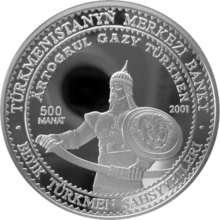Ertuğrul Gazi
| Ertuğrul ارطغرل | |
|---|---|
| Ghazi | |
 Ertuğrul on a 2001 Turkmen coin
| |
| Successor | Osman I |
| Born | Unknown |
| Died |
1280 Söğüt, Sultanate of Rum |
| Burial | Tomb of Ertuğrul Gazi, Söğüt |
| Spouse | Halime Hatun |
| Issue |
Osman I Gündüz Alp Saru Batu Savci Bey |
| Father | Suleyman Shah |
| Mother | Hayme Hatun |
| Religion | Sunni Islam |
Ertugrul (Ottoman Turkish: ارطغرل, Turkish: Ertuğrul Gazi, Erṭoġrıl; often with the title Gazi) (died c. 1280) was the father of Osman I, the founder of the Ottoman Empire. While his historicity is proven by coins minted by Osman I which identify Ertuğrul as the name of his father, nothing else is known for certain about his life or activities. According to Ottoman tradition, he was the son of Suleyman Shah, leader of the Kayı tribe of Oghuz Turks, who fled from eastern Iran to Anatolia to escape the Mongol conquests. According to this legend, after the death of his father, Ertuğrul and his followers entered the service of the Seljuks of Rum, for which he was rewarded with dominion over the town of Söğüt on the frontier with the Byzantine Empire. This set off the chain of events that would ultimately lead to the founding of the Ottoman Empire. Like his son, Osman, and their descendants, Ertuğrul is often referred to as a Ghazi, a heroic champion fighter for the cause of Islam.
Nothing is known with certainty about Ertuğrul's life, except that he existed and was the father of Osman, the first ruler of what was to become the Ottoman Empire. Historians are thus forced to rely upon stories written about him by the Ottomans more than a century later, which are of questionable accuracy. According to these later traditions, Ertuğrul was chief of the Kayı tribe of Oghuz Turks, as a result of his assistance to the Seljuks against the Byzantines. Ertuğrul was granted lands in Karaca Dağ, a mountainous area near Angora (now Ankara), by Ala ad-Din Kay Qubadh I, the Seljuk Sultan of Rûm. One account indicates that the Seljuk leader's rationale for granting Ertuğrul land was for Ertuğrul to repel any hostile incursion from the Byzantines or other adversary. Later, he received the village of Söğüt which he conquered together with the surrounding lands. That village, where he later died, became the Ottoman capital under his son Osman I. Ertuğrul had two other sons, Saru Batu Savcı Bey and Gündüz Bey.
...
Wikipedia
